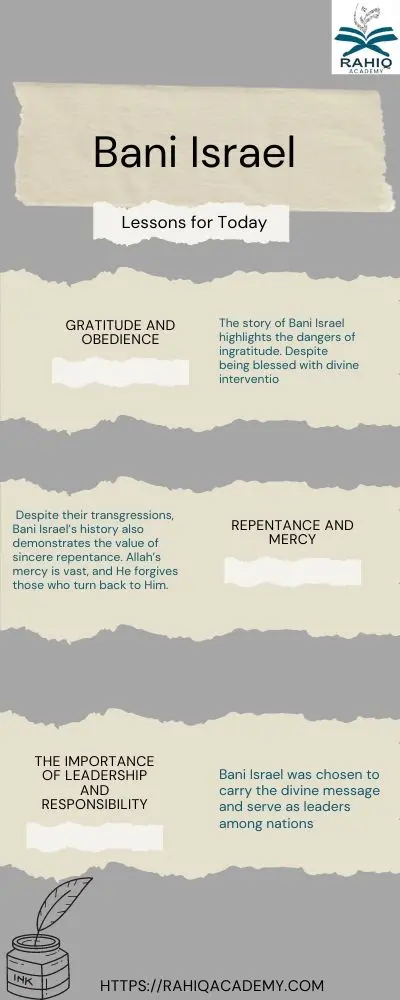Bani Israel history is profoundly significant in Islamic tradition. As descendants of Prophet Yaqub (Jacob), they were recipients of numerous blessings, divine guidance, and prophets. The Quran frequently mentions their story to teach important lessons about obedience, ingratitude, and the consequences of disobedience to Allah.
Through the miracles they witnessed and the guidance they received from prophets like Musa (Moses), Dawood (David), and Sulayman (Solomon), Bani Israel’s experiences offer invaluable insights into faith, leadership, and the importance of adhering to divine laws.
Who Was Bani Israel?
Bani Israel refers to the descendants of Prophet Yaqub (Israel), whose twelve sons became the forefathers of the twelve tribes of Israel. Their journey as a nation is deeply rooted in the Quran and the teachings of the prophets. They were a community entrusted with divine revelation, starting with the Torah revealed to Musa, and were often blessed with direct communication from Allah through His prophets.
The Quran emphasizes the distinction and responsibility of Bani Israel:
وَإِذْ أَخَذْنَا مِيثَاقَ بَنِي إِسْرَائِيلَ لَا تَعْبُدُونَ إِلَّا اللَّهَ وَبِالْوَالِدَيْنِ إِحْسَانًا
“And [recall] when We took the covenant from the Children of Israel, [enjoining upon them], ‘Do not worship except Allah; and to parents do good.’”
(Surah Al-Baqarah, 2:83)
Despite the numerous blessings, Bani Israel is repeatedly warned in the Quran about their transgressions and disobedience. Their story serves as a reminder that being chosen by Allah is not a guarantee of salvation unless accompanied by obedience and gratitude.
The History of Bani Israel
The history of Bani Israel is replete with divine intervention and trials. After being enslaved in Egypt for generations, they were liberated under the leadership of Prophet Musa. The miraculous parting of the Red Sea, the destruction of Pharaoh’s army, and the subsequent revelations of the Torah were defining moments in their history.
وَإِذْ فَرَقْنَا بِكُمُ الْبَحْرَ فَأَنجَيْنَاكُمْ وَأَغْرَقْنَا آلَ فِرْعَوْنَ وَأَنتُمْ تَنظُرُونَ
“And [recall] when We parted the sea for you and saved you and drowned the people of Pharaoh while you were looking on.”
(Surah Al-Baqarah, 2:50)
However, despite witnessing such miracles, Bani Israel struggled with maintaining their commitment to Allah. Their failure to uphold their covenant, as demonstrated in their worship of the golden calf during Musa’s absence, is one of the most significant incidents in their history. This act of disobedience led to severe consequences, reinforcing the lesson that divine favor requires adherence to Allah’s commandments.
Killings of Prophets of Allah
One of the most tragic aspects of Bani Israel’s history is their persecution and killings of prophets of Allah. The Quran and Hadith repeatedly refer to their mistreatment of the messengers sent to guide them. This severe sin is highlighted as an example of how far they strayed from the path of righteousness.
Bani Israel are the nation to whom Allah sent the most prophets, and paradoxically, they are also the nation that harmed the messengers the most. Their situation deteriorated to the point where they were known for killing their prophets. Allah mentions this in the Quran in several places:
أَفَكُلَّمَا جَاءَكُمْ رَسُولٌ بِمَا لَا تَهْوَىٰ أَنفُسُكُمُ اسْتَكْبَرْتُمْ فَفَرِيقًا كَذَّبْتُمْ وَفَرِيقًا تَقْتُلُونَ
“Is it that whenever there came to you a Messenger with what you yourselves desired not, you grew arrogant? Some, you disbelieved and some, you killed.” (Al-Baqarah: 87)
لَقَدْ أَخَذْنَا مِيثَاقَ بَنِي إِسْرَائِيلَ وَأَرْسَلْنَا إِلَيْهِمْ رُسُلًا ۖ كُلَّمَا جَاءَهُمْ رَسُولٌ بِمَا لَا تَهْوَىٰ أَنفُسُهُمْ فَرِيقًا كَذَّبُوا وَفَرِيقًا يَقْتُلُونَ
“We had already taken the covenant of the Children of Israel and had sent to them messengers. Whenever there came to them a messenger with what their souls did not desire, a party [of messengers] they denied, and another party they killed.” (Al-Ma’idah: 70)
فَبِمَا نَقْضِهِم مِّيثَاقَهُمْ وَكُفْرِهِم بِآيَاتِ اللَّهِ وَقَتْلِهِمُ الْأَنبِيَاءَ بِغَيْرِ حَقٍّ وَقَوْلِهِمْ قُلُوبُنَا غُلْفٌ ۚ بَلْ طَبَعَ اللَّهُ عَلَيْهَا بِكُفْرِهِمْ فَلَا يُؤْمِنُونَ إِلَّا قَلِيلًا
“And [We cursed them] for their breaking of the covenant and their disbelief in the signs of Allah and their killing of the prophets without right and their saying, ‘Our hearts are wrapped’. Rather, Allah has sealed them because of their disbelief, so they believe not, except for a few.” (An-Nisa: 155)
Prophets like Zakariya (Zechariah) and Yahya (John the Baptist) were among those targeted by Bani Israel, as mentioned in Islamic tradition. Their willingness to reject and kill prophets is considered one of the gravest acts of disobedience.
وقد صح في مسند الإمام أحمد عن ابن مسعود قال رسول الله صلى الله عليه وسلم: [أشد الناس عذابا يوم القيامة رجل قتل نبيا أو قتله نبي، أو رجل يضل الناس بغير علم، أو مصور يصور التماثيل](صحيح الجامع).
It is also authentically reported in Musnad Imam Ahmad that Ibn Mas’ud narrated that the Messenger of Allah (peace be upon him) said: “The people who will receive the severest punishment on the Day of Resurrection are a man who killed a prophet, or a man whom a prophet killed, or a man who leads people astray without knowledge, or a maker of images.” (Sahih Al-Jami)
Punishment from Allah
Allah punished them with humiliation, wretchedness, and disgrace in this world, and painful torment in the Hereafter:
ضُرِبَتْ عَلَيْهِمُ الذِّلَّةُ أَيْنَ مَا ثُقِفُوا إِلَّا بِحَبْلٍ مِّنَ اللَّهِ وَحَبْلٍ مِّنَ النَّاسِ وَبَاءُوا بِغَضَبٍ مِّنَ اللَّهِ وَضُرِبَتْ عَلَيْهِمُ الْمَسْكَنَةُ ۚ ذَٰلِكَ بِأَنَّهُمْ كَانُوا يَكْفُرُونَ بِآيَاتِ اللَّهِ وَيَقْتُلُونَ الْأَنبِيَاءَ بِغَيْرِ حَقٍّ ۚ ذَٰلِكَ بِمَا عَصَوا وَّكَانُوا يَعْتَدُونَ
“They have been put under humiliation [by Allah] wherever they are overtaken, except for a covenant from Allah and a rope from the Muslims. And they have drawn upon themselves anger from Allah and have been put under destitution. That is because they disbelieved in the verses of Allah and killed the prophets without right. That is because they disobeyed and [habitually] transgressed.” (Al ‘Imran: 112)
This is exactly what Allah promised them on the Day of Judgment:
إِنَّ الَّذِينَ يَكْفُرُونَ بِآيَاتِ اللَّهِ وَيَقْتُلُونَ النَّبِيِّينَ بِغَيْرِ حَقٍّ وَيَقْتُلُونَ الَّذِينَ يَأْمُرُونَ بِالْقِسْطِ مِنَ النَّاسِ فَبَشِّرْهُم بِعَذَابٍ أَلِيمٍ . أُولَٰئِكَ الَّذِينَ حَبِطَتْ أَعْمَالُهُمْ فِي الدُّنْيَا وَالْآخِرَةِ وَمَا لَهُم مِّن نَّاصِرِينَ
“Indeed, those who disbelieve in the signs of Allah and kill the prophets without right and kill those who order justice from among the people – give them tidings of a painful punishment. They are the ones whose deeds have become worthless in this world and the Hereafter, and for them there will be no helpers.” (Al ‘Imran: 21-22)
These are the Jews, and this is their relationship with the prophets and messengers. If this is their state, how would their condition and treatment be towards the rest of creation, especially the sincere believing servants of Allah?
Worshipping The Calf

Perhaps one of the most infamous episodes in Bani Israel’s history is their worship of the golden calf. While Prophet Musa was on Mount Sinai receiving the Torah, some among Bani Israel, influenced by Samiri, crafted a calf from gold and began to worship it. This act of idolatry represented a severe breach of their covenant with Allah.
وَاتَّخَذَ قَوْمُ مُوسَىٰ مِن بَعْدِهِ مِنْ حُلِيِّهِمْ عِجْلًا جَسَدًا لَّهُ خُوَارٌ أَلَمْ يَرَوْا أَنَّهُ لَا يُكَلِّمُهُمْ وَلَا يَهْدِيهِمْ سَبِيلًا اتَّخَذُوهُ وَكَانُوا ظَالِمِينَ
“And the people of Moses made, after [his departure], from their ornaments a calf – an image having a lowing sound. Did they not see that it could neither speak to them nor guide them to a way? They took it [for worship], and they were wrongdoers.”
(Surah Al-A’raf, 7:148)
This incident teaches the critical importance of patience and obedience to Allah’s commands. Despite their transgression, Musa prayed for forgiveness on behalf of his people, showing the value of repentance.
Refusal to Accept Torah
Despite being given the divine Torah, many among Bani Israel resisted fully embracing its teachings. The Quran recounts their reluctance and hesitation, emphasizing that Allah raised Mount Sinai over them as a reminder of the seriousness of their covenant.
وَإِذْ أَخَذْنَا مِيثَاقَكُمْ وَرَفَعْنَا فَوْقَكُمُ الطُّورَ خُذُوا مَا آتَيْنَاكُم بِقُوَّةٍ وَاذْكُرُوا مَا فِيهِ لَعَلَّكُمْ تَتَّقُونَ
“And [recall] when We took your covenant and raised over you the mount, [saying], ‘Take what We have given you with determination and remember what is in it that you might fear Allah.'”
(Surah Al-Baqarah, 2:63)
This refusal represents a broader theme of disobedience, where Bani Israel, despite witnessing miracles, chose to deviate from the divine path.
Lessons for Today

The story of Bani Israel is a powerful reminder for Muslims today about the importance of obedience, gratitude, and humility. The Quran uses their experiences to teach lessons about steadfastness in faith, the consequences of disobedience, and the mercy of Allah.
- Gratitude and Obedience: The story of Bani Israel highlights the dangers of ingratitude. Despite being blessed with divine intervention, they repeatedly failed to show gratitude. Muslims are reminded to be thankful for Allah’s blessings and to obey His commands fully.
- Repentance and Mercy: Despite their transgressions, Bani Israel’s history also demonstrates the value of sincere repentance. Allah’s mercy is vast, and He forgives those who turn back to Him.
- The Importance of Leadership and Responsibility: Bani Israel was chosen to carry the divine message and serve as leaders among nations. Their failure to live up to this responsibility serves as a cautionary lesson for Muslims about the importance of leadership and fulfilling one’s obligations.
Why did Allah Favour Bani Israel?
Allah’s favor upon Bani Israel is highlighted throughout the Quran. They were chosen to receive prophets, divine guidance, and numerous blessings. This favor was based on their potential to uphold the divine message and lead by example.
وَلَقَدْ آتَيْنَا بَنِي إِسْرَائِيلَ الْكِتَابَ وَالْحُكْمَ وَالنُّبُوَّةَ وَرَزَقْنَاهُم مِّنَ الطَّيِّبَاتِ وَفَضَّلْنَاهُمْ عَلَى الْعَالَمِينَ
“And We gave the Children of Israel the Scripture and judgment and prophethood, and We provided them with good things and preferred them over the worlds.”
(Surah Al-Jathiyah, 45:16)
However, their favor came with a great responsibility. The Quran and Hadith emphasize that Allah’s favor is contingent upon obedience and upholding His commandments. When they failed to meet these conditions, they faced the consequences of their actions.
Conclusion
The story of Bani Israel is a complex narrative filled with divine blessings,guidance, and warnings. Their history offers timeless lessons about the importance of faith, obedience, and the consequences of disobedience. For Muslims today, reflecting on their experiences is crucial for understanding the relationship between divine favor and human responsibility.
Through their story, Allah teaches us the importance of gratitude, repentance, and fulfilling our obligations as His servants.




